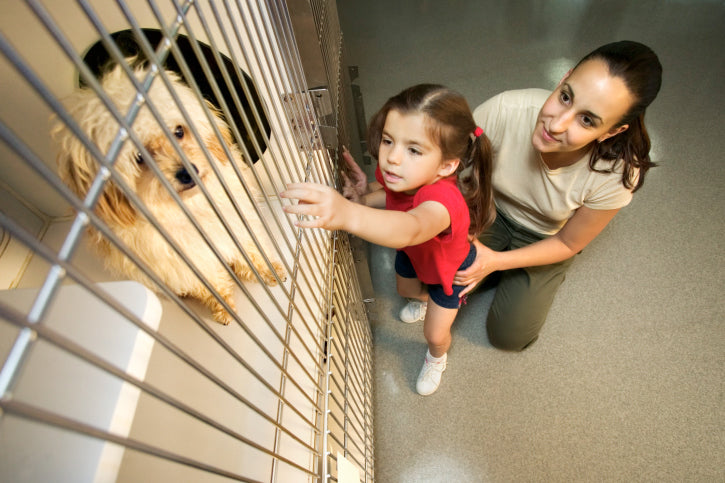There is an epidemic of homeless dogs in this country!
There are an estimated 3.9 million dogs placed in shelters annually because of unwanted behavior problems and medical need. Unfortunately for many of these dogs, the outcome is bleak. However, due in part to the thousands of shelters and rescue organizations working diligently, many of these dog’s lives have a happy ending.
But what happens to those dogs who don’t end up as new members of a family? The ones who are seen as unadoptable or returned for the unwanted behavior or medical issues which outlasted their novelty or cuteness quotient?
This is the unspoken underbelly of pet adoption and animal rescue which has thousands of animal lovers worldwide scrambling to figure out an answer to this problem.
Here in Los Angeles, the homeless pet population is so out of control there are literally packs of stray dogs roaming the streets in some neighborhoods! The shelters and rescues are overflowing with thousands of pets who need a home and the sad reality is that dogs are dying every day. Pets of all kinds are being shuttled from one foster home or kennel to the next as space becomes available out of sheer desperation on the part of rescue volunteers and shelter workers to try to keep these dogs alive until they (if they are lucky) find a new family. One extreme example I’ve seen is a person who operates a dog rescue in Hollywood who had 46 (Yes, 46!) dogs in their home as a result of their ongoing struggle trying to find families for these pets.
I have the opportunity to work with numerous rescues and animal shelters to help with dogs who are the most challenging re-home or keep getting returned for their behavior problems. I’ve also trained the dogs who were adopted by the amazing people who were willing to take on some “doggie baggage” and invest a little time and effort to help rehabilitate their dogs in hopes of making them happy and balanced family members.
What I find is that these dogs are not as “bad” and the problems are usually not as severe as they are interpreted to be by those who felt inclined to label them by their issues and never saw their true potential. I find a deep level of satisfaction when I demonstrate a dog’s ability to happily listen and be calm whose owner thought they were a lost cause based on someone else’s misinterpretation or lack of effort. It makes these people so happy to see some hope when all their dog needed was proper communication and consistency to solve their problems to make them great family pets.
5 Tips for Adopting a Rescue/Shelter Dog:
1. Choose Wisely
There are thousands of dogs available for adoption. Because of this, you have a wide range of breed, personality, and age of dogs to choose from. Do not feel bad if you get an “easier” dog because you are self-aware enough to know your limitations. This is a good thing, just be realistic and spend as much time as possible with the dog you are thinking of adopting to make sure you see all aspects of their personality, good and bad.
In some cases, rescues will allow you to foster a dog first for a week or two without commitment to ensure you and the dog are a good match. Remember though, most dogs can be a good match with a little work!
2. Don’t Panic
You may have thought at first you could deal with a dog who barks a bit too much or pees on the rug but you are quickly losing your patience. Believe it or not, most problem behaviors can be resolved with a few weeks of consistent effort and training. There are many talented local dog trainers who can help you with this. Chances are your dog ended up in a shelter because no one took the time to teach him how to behave. This is an opportunity to take on this satisfying job your dog and you will both benefit from!
3. Exercise and Activity
This is why you got a dog, right? Get out with your dog… Exercise and socialize as much as possible!
4. Health and Nutrition
A proper diet is key to a long healthy life for your dog. Many dogs who come from shelters are malnourished or have health / behavioral issues due to poor diet. A high quality diet plus additional vitamins and supplements can really make a difference in optimizing your dog’s physical and mental health.
5. Look Within
The reality is, not everyone is suited for dog ownership. Although most people can be great dog owners, some humans are just too busy or have personalities that are not conducive to the logistical and emotional responsibilities associated with dog ownership. Before you adopt, look within and ask yourself if you are ready for the potential challenges of owning a new dog. If not, there are always goldfish…
 Brett Endes
Brett Endes
Brett Endes (The Dog Savant) is a Los Angeles-based dog trainer and behavior expert who has 22 years experience working with severe problem behavior and rescue dogs. Brett is a graduate of the State University of New York and is the owner of Ican! K9, a state of the art training, boarding, and aqua therapy facility in L.A. He is known for his unique personality and effective style of dog communication he has developed by his years of work as an applied canine behavior expert. Brett lives in Los Angeles with his daughter Skylar and their Rottweiler Boo. To learn more about Brett visit www.dogtrainingla.com. Please forward all inquiries to dogtrainingla@gmail.com.







